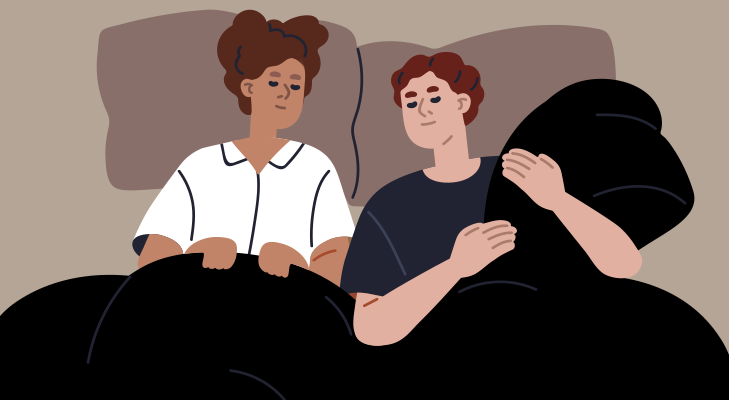You may have seen the news stories lately about how Gen Z’s attitude toward life is different from older generations. More specifically, Gen Z is known for prioritizing work/life balance and being more vocal about their mental health struggles.
It turns out Gen Z—and their adjacent age cohort, Millennials—also have healthier sleep habits compared to their older counterparts.
According to a recent Saatva survey of 2,000 Americans conducted in partnership with YouGov, Gen Z (ages 18-27) and Millennials (ages 28-43) report better sleep quality than Gen X (ages 44-59) and Boomers (60+).
Curious to learn more about how young people are leading the charge when it comes to prioritizing their sleep and the specific sleep problems each generation is currently facing? Ahead is a deep dive into our survey results.
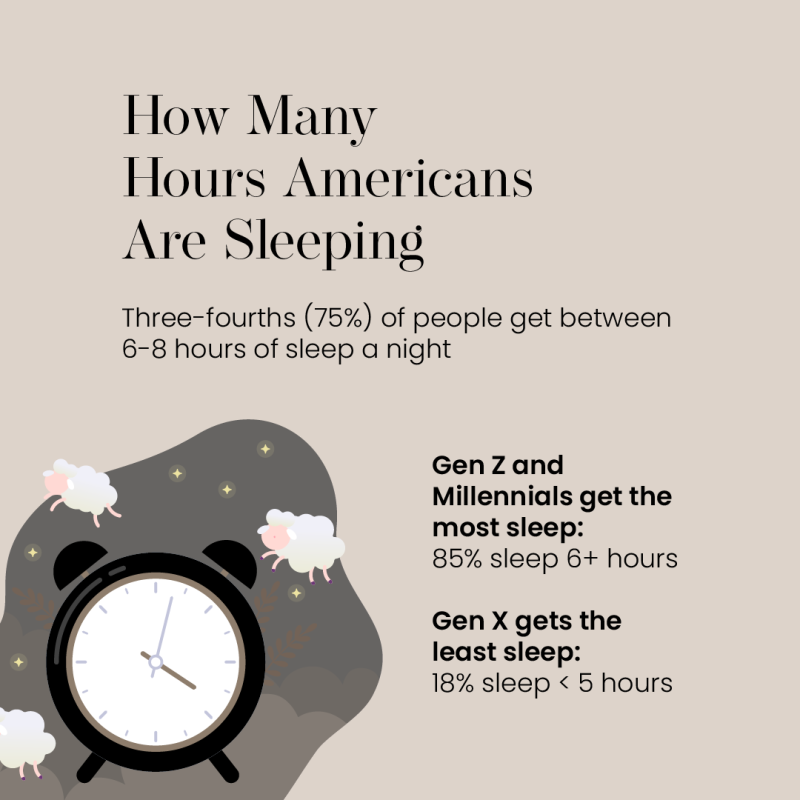
How long do Americans sleep?
On average, 75% of Americans get six to eight hours of sleep each night, while 14% get five hours of sleep or less.
Gen Z and Millennials sleep the most, with 85% getting six or more hours of sleep per night. Gen X, on the other hand, reports the least amount of sleep, with 18% getting five hours of sleep or less.
Shantha Gowda, PsyD, founder of Think Sleep and member of Saatva’s advisory panel, notes that Gen X is the “sandwich” generation, meaning they’re raising young children and dealing with aging parents. This could be why they’re sleeping less than other age groups.
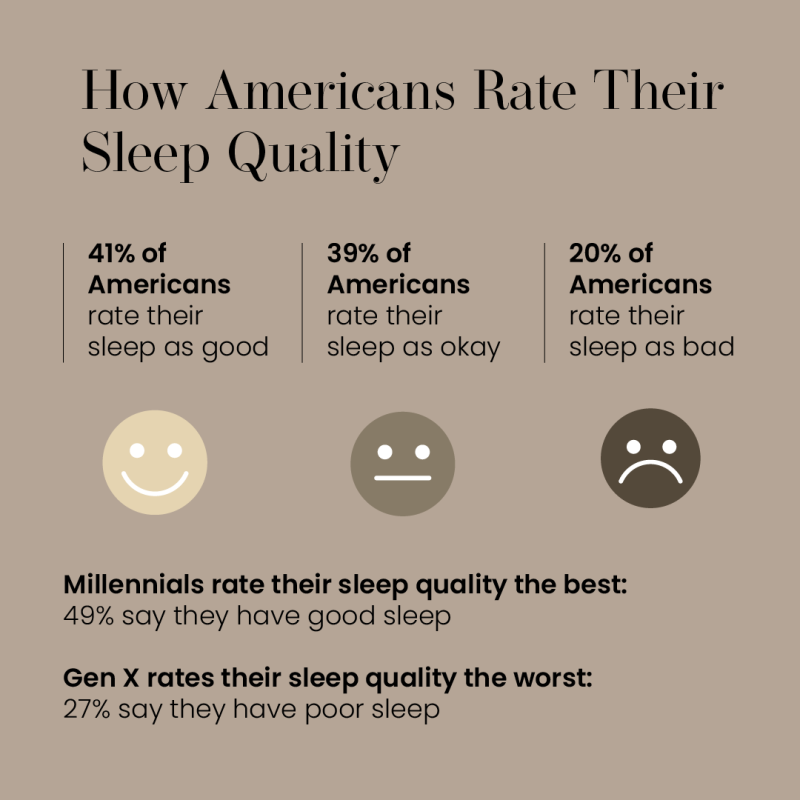
How do Americans rate their sleep quality?
Most Americans rate their sleep as average (three out of five). When broken down by age group, Gen Z and Millennials report higher rates of good sleep compared to the overall average, while Gen X and Boomers report higher rates of poor sleep.
“Younger people tend to report better sleep quality than older people,” says Gowda. “It’s a common topic that I see in my practice.”
Jessica P., a Gen Xer, shares her struggles with waking up throughout the night: “While I consistently wake up at 7 am to start my day, I never really sleep through the night without waking up,” she says. “Sometimes, I wake up around 5 am randomly, and when this happens, it’s just a matter of being disciplined enough to go back to bed and not look at my phone or stay up.”
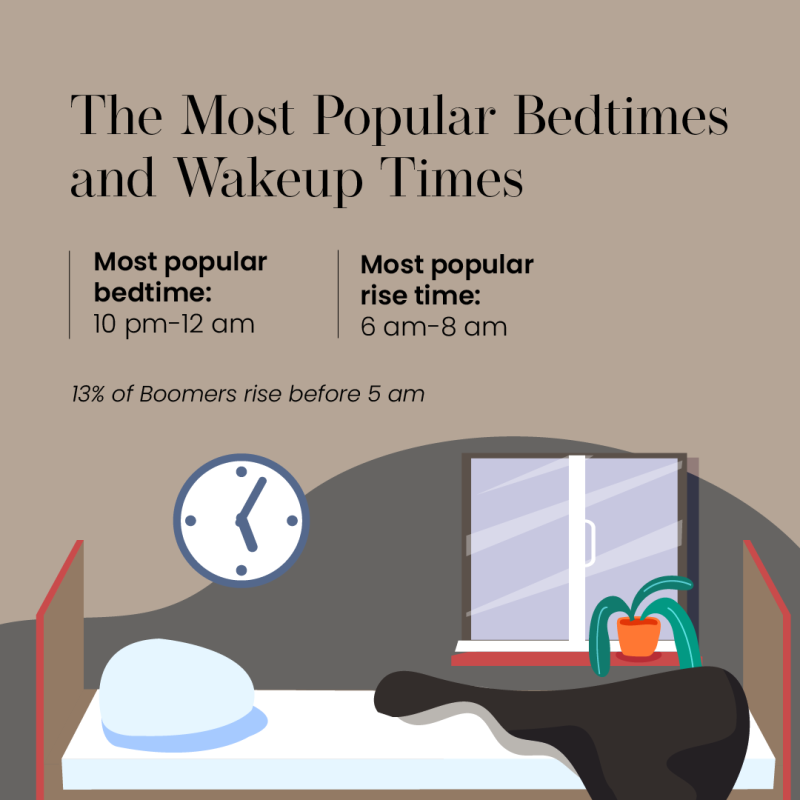
What are the most popular bedtimes and wakeup times?
The most common bedtime across all generations is between 10 pm and 12 am. However, Gen Z has the highest percentage of individuals going to bed after midnight, with 30% reporting later bedtimes.
People in their teens and early 20s naturally fall asleep later and are also dealing with things like homework, college classes, using screens at night, and work, explains Gowda.
Guadalupe M., a Gen Z elementary school teacher, says her sleep schedule varies as she manages work, the gym, and her social life. “I typically go to bed on the weekdays between 11 pm and 1 am, and I wake up between 4:20 am and 5:30 am at the latest,” she says.
The most popular wake-up time across generations is between 6 am and 8 am. Gen Z tends to wake up later than other generations.
This could be due to Gen Z entering the workforce during the COVID-19 pandemic when many companies moved to remote work. “A rise in remote work could be contributing to increased sleep time and a later wake-up time,” says Gowda.
Boomers have the highest percentage of early risers, with 13% waking up before 5 am.
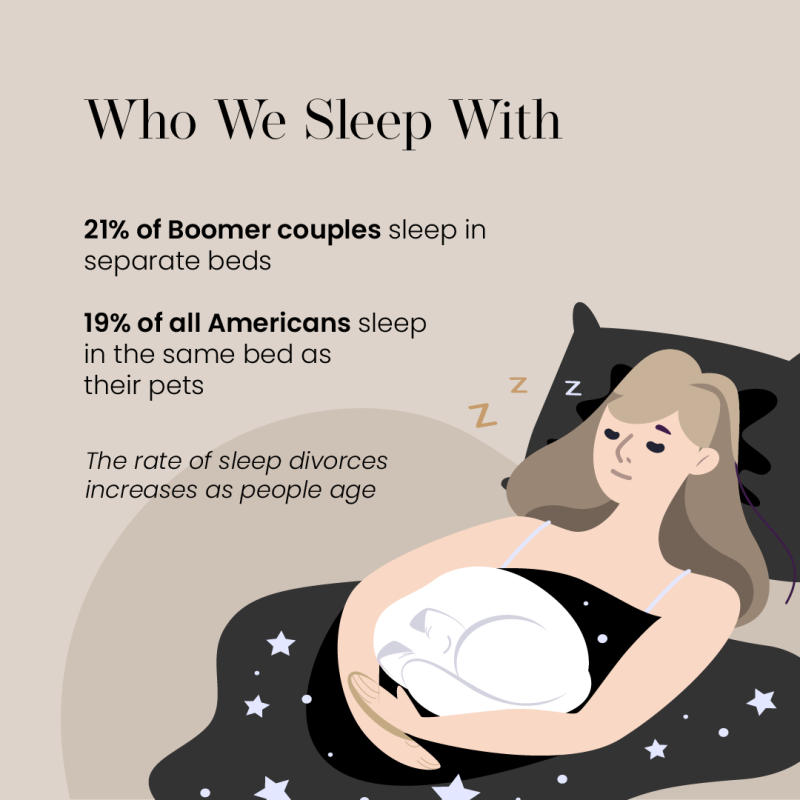
What’s the most common sleeping arrangement?
A majority (43%) of our survey respondents sleep with a partner, while 19% of all Americans sleep with their pets. However, 21% of Boomer couples actually sleep in separate beds—a concept known as a “sleep divorce.”
Sleep divorces don’t necessarily indicate relationship issues; instead, many partners choose this arrangement to improve their health, sleep hygiene, and overall sleep quality, which could benefit the relationship.
Anthony P., a Boomer, shares that he and his wife sleep separately due to his snoring. “I wake myself up many times during the night due to snoring,” he says. “So, my wife and I haven’t slept in the same bed in years.”
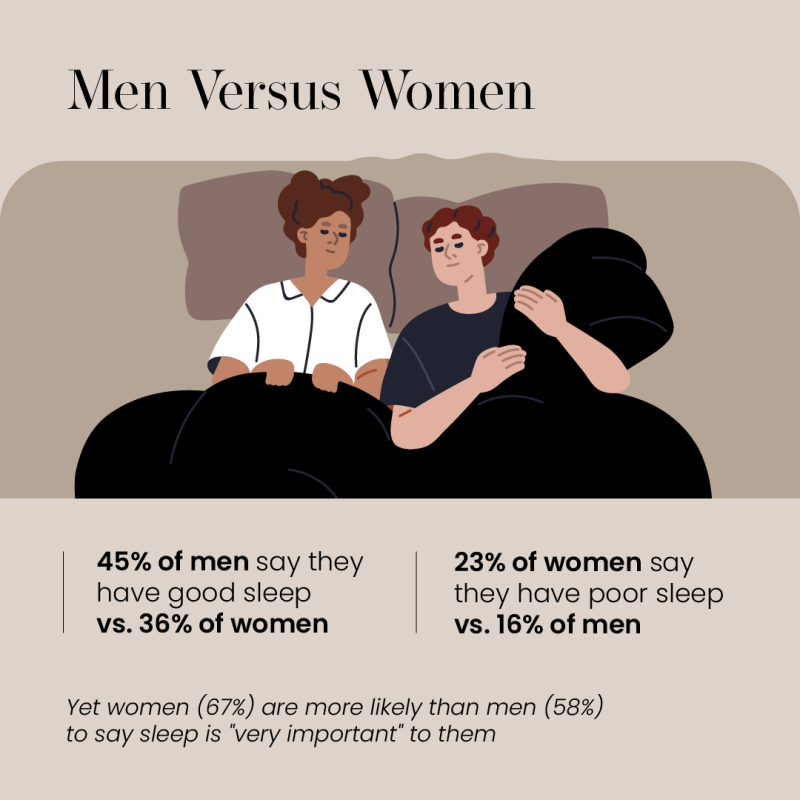
How does sleep quality differ between men and women?
Sleep affects men and women differently due to various biological and lifestyle factors. These factors include—but are not limited to—hormonal differences, body temperature, stress and mental health, caregiving responsibilities, and pain sensitivity.
Here are some of the biggest differences we found between men and women in our survey:
- More women (37%) have trouble falling asleep than men (31%)
- More women (40%) have trouble staying asleep than men (35%)
- More men (45%) rate their overall sleep quality as good than women (36%)
“My sleep quality right now is a three out of five because I have a 4-month-old baby and a 3-year-old toddler who recently transitioned to a new toddler bed and has been getting up every now and then,” says Tiffany A., a Millennial. “The baby also wakes up for feedings, so I get maybe a good four-hour stretch of sleep at the beginning and then it varies throughout the night.”
Tiffany adds that she wakes up feeling groggy and sleepy due to her four-month-old’s sleep regression. “I’ve been partly dreaming and unsure of what’s reality or a dream,” she says. “Sometimes, I imagine waking up, which prompts me to get up in real time and check on my baby. This leaves me feeling groggy and confused, like ‘What’s happening?’ and also feeling sleepy as he often wakes up during my deep sleep.”
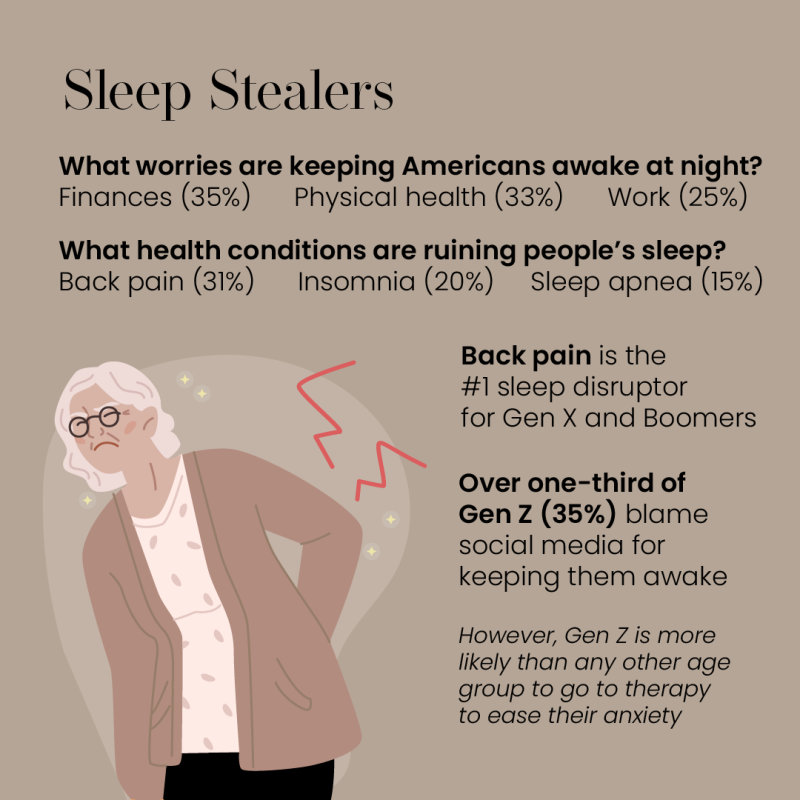
What’s keeping Americans awake at night?
In a 2021 survey amid the height of the pandemic, we asked 2,000 Americans about their top sleep disruptors. Their answers included next-day anxiety (41%), replaying the day’s events (37%), and temperature discomfort (31%).
In our most recent survey, the top sleep disruptors were different. This year, what’s keeping people awake at night includes finances (35%), physical health (33%), work (25%), and friends/family (25%).
Gen Z is most affected by social media, work, and finances; Millennials and Gen X by finances, physical health, and work; Boomers by physical health, finances, and current events.
Jorge T., a Gen Z police officer, shares his worries about finances and work, particularly since buying a home and expecting a baby. “As I’m doing my stuff for the night, I’m like, ‘I need to pay this bill by tomorrow, I need to do this, I need to do that,’” he says. “And then I wonder, ‘How is work going to go tomorrow with a new case? Or why am I being dispatched to patrol this specific area tomorrow?’”
Physical health issues like back pain/chronic pain (31%), insomnia (20%), and sleep apnea (15%) also disrupt sleep, especially for the older age groups of Gen Xers and Boomers. Gowda attributes some of these sleep disruptors to undiagnosed conditions in older generations.
Anthony P., who works in the restaurant industry, experiences back pain caused by being on his feet for prolonged periods at his job, which delays his sleep. “Sometimes, I’m so beat up that I’m in pain, making it take longer to fall asleep,” he says. Anthony also suspects he may have sleep apnea, although he hasn’t been tested for it.
Millennials are especially affected by insomnia, given they are often at the peak of their career while juggling parenthood. Engaging with social media affects their sleep too.
“I scroll through my Instagram account or read through some of the news alerts as I’m winding down at night, and that’s probably not always a good idea because it gives me anxiety,” says Tiffany A. “With work, it’s more like, ‘How do I balance everything when I’m off maternity leave and go back?’ I’m caring for kids while being sleep-deprived.”
“I scroll through my Instagram account or read through some of the news alerts as I’m winding down at night, and that’s probably not always a good idea because it gives me anxiety.”
Tiffany A., a Millennial
Social media usage most significantly impacts Gen Z’s sleep, with 35% of people in this age group stating that engaging with social media is the number one disruptor of their sleep.
Research shows social media usage can contribute to depression, anxiety, and low self-esteem, which can lead to insomnia. What’s more, exposure to blue light from a phone screen can also disrupt a person’s natural circadian rhythm and sleep.
However, Gowda says completely cutting out screens before bed isn’t necessarily the solution. If you’re sitting in a room all day with no sunlight, then a screen before bed is going to impact you more, she explains.
Plus, what you’re watching on your phone has a lot to do with how it affects your sleep. If you’re scrolling through social media and seeing things that are constantly getting your nervous system going, then that’s going to negatively impact your sleep, she says. That’s different from if you’re watching a comedy that relaxes you before bed.
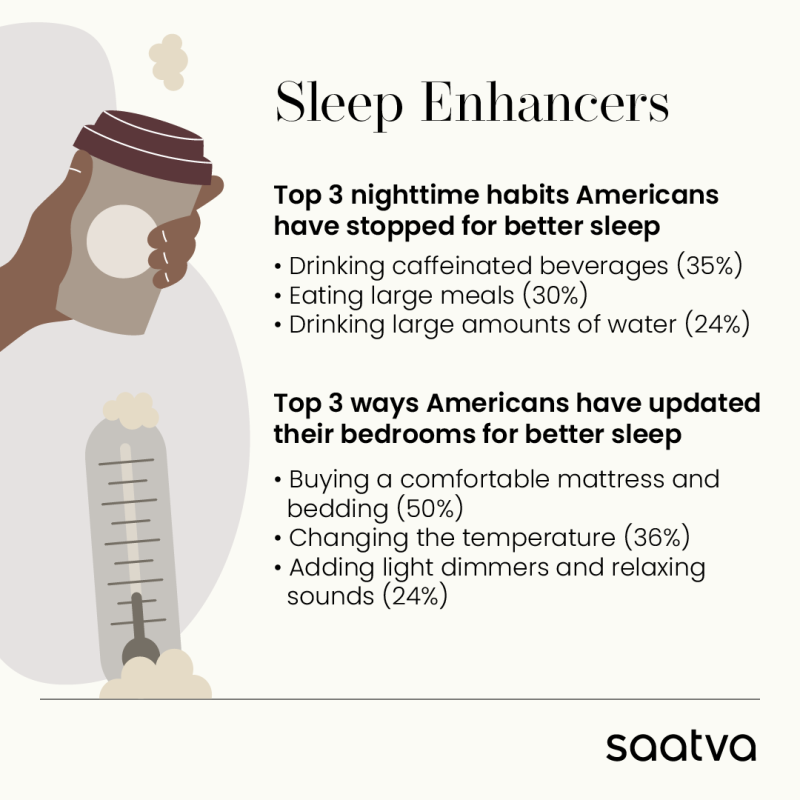
What’s helping Americans sleep better?
Our survey revealed these were the top habits Americans have eliminated before bed for better sleep:
- 35% stopped drinking caffeinated beverages
- 30% stopped eating large meals
- 24% stopped drinking large quantities of water
Caffeine consumption before bed is the most common habit people have ditched. According to Gowda, caffeine is a significantly underestimated sleep disruptor in the US.
“A lot of things have caffeine that you don’t realize, and it can still impact middle-of-the-night awakenings and you won’t even know it,” she says.
Alternatively, these are the top habits Americans have adopted to enhance their sleep:
- 61% have tried playing or listening to music
- 50% bought a comfortable mattress and bedding
- 44% have tried exercising
- 36% changed the temperature in their room
- 29% have tried meditation
- 24% added light dimmers and relaxing sounds
Music, surprisingly, emerged as the most popular sleep-improving habit across all generations, especially among Gen Z. On the other hand, more Millennials than any other generation reported trying exercise or meditation to aid their shuteye.
In the interviews we conducted, individuals across generations shared the sleep aids that are currently on their radar, including magnesium powder, sleep masks, nighttime skincare, and earplugs.
“I started taking magnesium powder before bed, which has helped me stay asleep and have deeper sleep cycles,” says Jessica P. “I mix the powder with a cup of boiled water and take it around 10 pm or earlier. It’s become a regular thing.”
Meanwhile, Gowda notes that while new bedding won’t suddenly make you sleep better, “It will create a positive association that will evoke joy and relax your nervous system—and that will promote better sleep.”
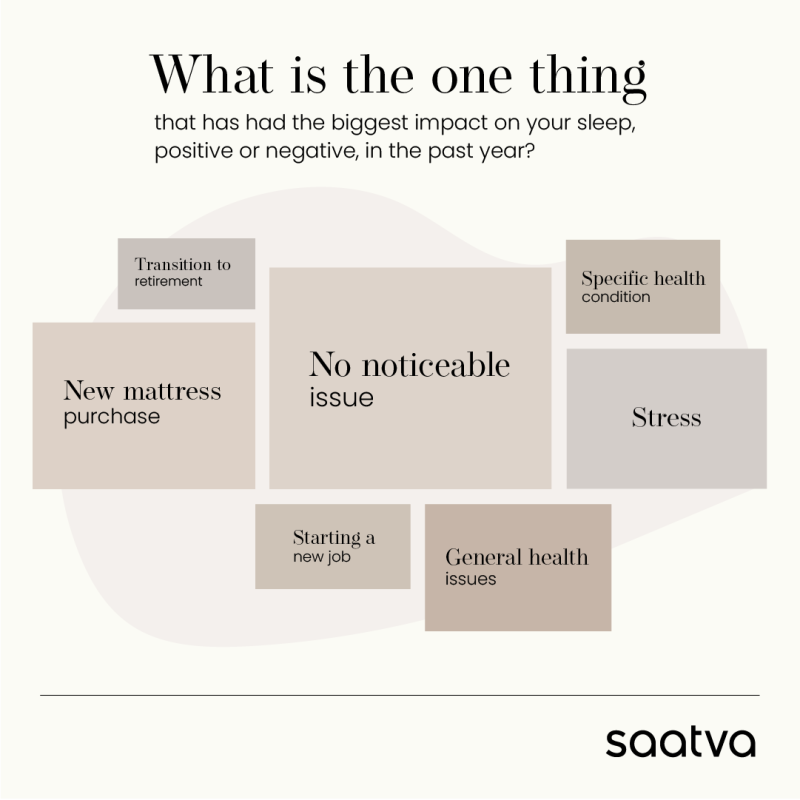
What’s had the biggest impact on Americans’ sleep in the past year
We finished our survey with an open-ended question, asking participants to share the one thing that’s impacted their sleep the most in the past year, whether positive or negative.
The most common responses were:
- No noticeable issue (153 responses)
- New mattress purchase (96 responses)
- Stress (63 responses)
- General health issues (43 responses)
- Specific health condition (39 responses)
- Starting a new job (27 responses)
- Transition to retirement (26 responses)
Notably, a significant portion of respondents said a new mattress purchase had a considerable effect on their sleep. This makes sense given that a new mattress can help alleviate back pain and provide a more comfortable sleep surface.
All figures, unless otherwise stated, are from YouGov Plc. Total sample size was 2017 adults. Fieldwork was undertaken between 8th – 12th April 2024. The survey was carried out online. The figures have been weighted and are representative of all US adults (aged 18+).

